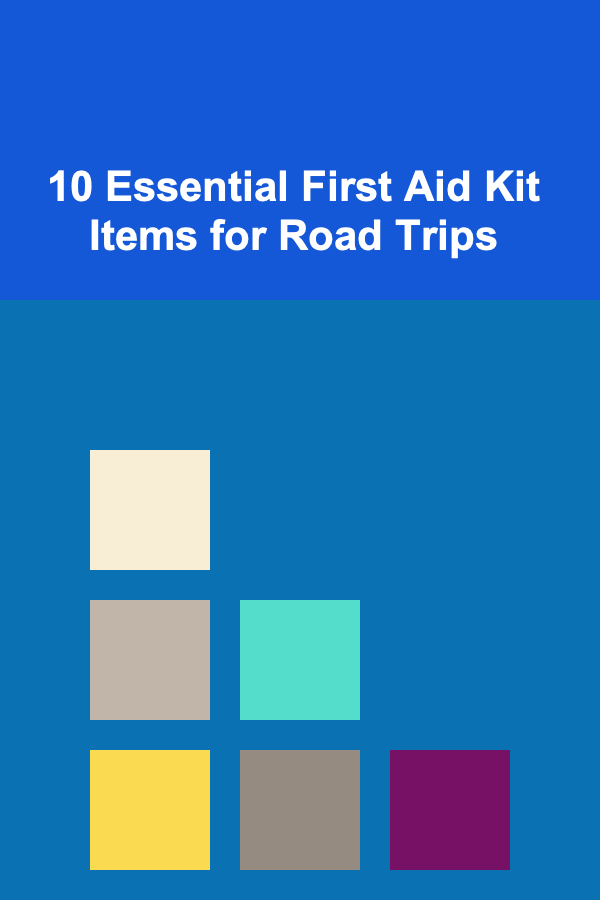
10 Essential First Aid Kit Items for Road Trips
ebook include PDF & Audio bundle (Micro Guide)
$12.99$5.99
Limited Time Offer! Order within the next:

Embarking on a road trip is an exciting adventure, whether you're driving across the country or heading out for a weekend getaway. However, while the open road can offer a sense of freedom, it's essential to be prepared for the unexpected. One of the most critical preparations you can make for your journey is ensuring that you have a well-stocked first aid kit. Accidents, minor injuries, or sudden illnesses can occur anywhere, and having the right supplies can help you respond effectively, ensuring your safety and the safety of your passengers.
In this article, we'll walk through 10 essential items that should be included in your road trip first aid kit. These items cover a wide range of potential issues, from minor cuts and scrapes to more serious medical emergencies. Having these items on hand can help you handle situations effectively, keeping your journey safe and enjoyable.
Adhesive Bandages (Band-Aids)
Adhesive bandages are a must-have for any first aid kit, and they should be one of the first items you pack. From paper cuts to small abrasions and blisters, band-aids can quickly cover minor wounds, preventing dirt and bacteria from entering the wound and reducing the risk of infection.
Why They're Important:
- Versatile: Band-aids are suitable for cuts, scrapes, blisters, and even small puncture wounds.
- Prevention: They provide a protective barrier against dirt, water, and germs.
- Comfort: They can help reduce pain and discomfort by covering the wound.
When selecting bandages for your first aid kit, make sure to include various sizes to accommodate different types of injuries. Additionally, you might want to consider those with a cushioned or gel pad to help ease pressure and speed up healing.
Antiseptic Wipes or Antibacterial Ointment
Keeping wounds clean is essential for preventing infection. Antiseptic wipes or antibacterial ointments are crucial for disinfecting cuts, scrapes, or even insect bites. These items help cleanse the wound before applying a bandage or dressing, ensuring that germs and dirt don't cause any complications.
Why They're Important:
- Infection Prevention: These products help kill bacteria that could infect a wound.
- Easy to Use: Antiseptic wipes are portable, making them a great option for on-the-go cleaning.
- Pain Relief: Some antiseptics, like those containing lidocaine, also provide mild numbing relief for painful wounds.
When packing your first aid kit, look for antiseptic wipes with alcohol-free formulas to avoid skin irritation, especially for sensitive skin. A tube of antibacterial ointment like Neosporin is a great option for additional protection.
Pain Relievers and Anti-inflammatory Medications
Whether it's a headache, muscle ache, or joint pain, pain relievers and anti-inflammatory medications should be part of your first aid kit. Over-the-counter (OTC) medications like ibuprofen, acetaminophen (Tylenol), or aspirin can provide relief for minor discomforts that may arise during your road trip.
Why They're Important:
- Pain Management: These medications can help alleviate headaches, back pain, sore muscles, and even dental discomfort.
- Anti-inflammatory: Medications like ibuprofen can help reduce swelling from sprains, strains, or injuries.
- Accessible: OTC pain relievers are widely available and easy to store in your kit.
Make sure to pack a variety of pain relievers, and remember to include an appropriate dosage guide. If you or anyone in your group has allergies or specific conditions, consider consulting a doctor for recommendations on which medications to carry.
Gauze Pads and Adhesive Tape
For more serious cuts or injuries, gauze pads and adhesive tape are vital components of your first aid kit. They help cover larger wounds, control bleeding, and keep the injured area clean until you can seek professional medical help if necessary.
Why They're Important:
- Bleeding Control: Gauze pads help absorb blood and control bleeding.
- Versatile: They can be used for a wide range of injuries, from deep cuts to larger abrasions.
- Wound Protection: The combination of gauze and adhesive tape helps secure the dressing in place, preventing contaminants from entering the wound.
When selecting gauze pads, make sure to get sterile pads to avoid infection. You'll also need strong adhesive tape to keep the dressing in place and prevent it from shifting.
Instant Cold Pack
In the event of an injury, such as a sprain, strain, or contusion, an instant cold pack can be a lifesaver. Cold therapy helps reduce swelling and numb pain by constricting blood vessels around the injury.
Why They're Important:
- Swelling Reduction: Applying cold helps reduce swelling and provides immediate pain relief for soft tissue injuries.
- Convenient: Instant cold packs are easy to activate and require no refrigeration.
- Portable: They're compact and take up little space in your first aid kit.
An instant cold pack is particularly helpful for injuries sustained during outdoor activities or physical exertion. Make sure to wrap the pack in a towel or cloth before applying it to prevent frostbite.
Thermometer
A thermometer is a small but essential item for checking body temperature. During long road trips, you or your passengers may develop a fever due to illness or infection. Being able to monitor temperature can help you assess whether further medical attention is needed.
Why It's Important:
- Fevers: A thermometer helps you determine if a fever is present, allowing you to make informed decisions.
- Peace of Mind: Knowing the temperature of someone experiencing symptoms can help prevent confusion or panic.
- Accurate Diagnosis: Helps determine if you should seek medical attention or if rest and hydration are enough.
Choose a thermometer that provides accurate and quick readings, whether it's a digital thermometer or a more advanced infrared version for non-invasive temperature taking.
Scissors and Tweezers
Scissors and tweezers are essential tools for managing injuries or preparing other first aid supplies. Scissors can be used to cut bandages, gauze, or clothing in an emergency, while tweezers are ideal for removing splinters, thorns, or stingers from insect bites.
Why They're Important:
- Cutting: Scissors are useful for cutting gauze, tape, or clothing if needed for treating a wound.
- Foreign Object Removal: Tweezers help with removing foreign objects like splinters, insect stingers, or glass fragments.
- Ease of Use: Both tools are compact and easy to carry, ensuring that you have what you need for emergency situations.
Ensure that both scissors and tweezers are made of durable, rust-resistant materials. It's also helpful to have a small pair of safety scissors that can cut through fabric quickly.
Burn Relief Gel or Cream
Burns can occur unexpectedly while cooking, handling hot items, or even from sun exposure during your road trip. Burn relief gel or cream can provide immediate relief and help promote healing for minor burns.
Why They're Important:
- Soothing: Burn relief gel provides cooling effects, reducing pain and discomfort from burns.
- Healing: These products help the skin heal faster and prevent infection.
- Sunburn Relief: Many burn gels also offer relief from sunburn, which can occur during long periods of sun exposure on the road.
Look for burn creams or gels that contain aloe vera, as this ingredient is known for its soothing and healing properties.
Allergy Medication
If you or any of your passengers have known allergies, it's critical to carry allergy medication. Whether it's for seasonal allergies, food allergies, or an allergic reaction to insect stings, antihistamines or epinephrine (in cases of severe reactions) should be part of your emergency kit.
Why They're Important:
- Immediate Relief: Antihistamines provide quick relief from symptoms like itching, hives, and sneezing.
- Severe Reactions: For severe reactions, carrying an epinephrine auto-injector (like an EpiPen) could save a life in case of anaphylaxis.
- Peace of Mind: Having the right allergy medication available reduces the stress of a potential allergic reaction during your trip.
If you carry an epinephrine injector, make sure everyone in your travel group knows how to use it in case of an emergency.
First Aid Manual
While it's crucial to have the right medical supplies, it's also important to have knowledge about how to use them. A first aid manual provides step-by-step guidance for managing various injuries or illnesses, helping you handle medical situations with confidence.
Why It's Important:
- Guidance: A manual can guide you through the proper techniques for treating different injuries or medical conditions.
- Education: It offers valuable information on CPR, wound care, and handling more serious medical emergencies.
- Confidence: Having a manual gives you peace of mind that you're prepared for unexpected medical situations.
Look for a small, portable first aid manual that covers a wide range of common injuries and emergencies. Many first aid kits include a small guide, but it's always a good idea to have a more detailed one.
Conclusion
While road trips are about adventure and exploring new places, ensuring your safety should always be a priority. Having a well-stocked first aid kit is a fundamental step in preparing for the unexpected. The items listed above are essential for managing common injuries and medical emergencies that may arise during your travels.
By packing the right tools and medications, you're not only ensuring your health and well-being but also gaining peace of mind that you're prepared for any situation. Before you hit the road, take the time to review and update your first aid kit, ensuring that you have all the necessary items to keep yourself and your passengers safe. Safe travels!
Reading More From Our Other Websites
- [Organization Tip 101] How to Set Up a Digital Calendar for Maximum Productivity
- [Personal Care Tips 101] How to Choose a Body Butter to Support Your Skin's Natural Barrier
- [Reading Habit Tip 101] Best Strategies for Overcoming Screen Fatigue and Reviving Your Reading Habit
- [Home Lighting 101] How to Choose the Right Argos Floor Lamps for Your Living Space
- [Home Security 101] How to Secure Your Home During Construction or Renovation
- [Metal Stamping Tip 101] Tooling Optimization Secrets: Reducing Wear and Extending Die Life for Lower Costs
- [Organization Tip 101] What Steps Can You Take to Keep Your Refrigerator Organized?
- [Sewing Tip 101] Turning Passion Into Scale: When and How to Expand Your Sewing Business
- [Organization Tip 101] Why You Should Create a Dream Board for Home Organization Goals
- [Home Soundproofing 101] How to Use Plants for Natural Sound Absorption in Your Home

From Controller to CFO: Essential Skills and Knowledge for Success
Read More
How to Create a Safe Room in Your Home for Maximum Security
Read More
How to Set Up a Checklist for Managing Your Vacation Photos and Memories
Read More
How to Stage Your Home for an Upcoming Real Estate Market Boom
Read More
How to Explore the Limits of Future Technology
Read More
How to Troubleshoot Common Cloud Service Errors
Read MoreOther Products

From Controller to CFO: Essential Skills and Knowledge for Success
Read More
How to Create a Safe Room in Your Home for Maximum Security
Read More
How to Set Up a Checklist for Managing Your Vacation Photos and Memories
Read More
How to Stage Your Home for an Upcoming Real Estate Market Boom
Read More
How to Explore the Limits of Future Technology
Read More